Operations and Project Management Strategies: Unilever Analysis
VerifiedAdded on 2023/06/18
|20
|6205
|405
Report
AI Summary
This report provides a detailed analysis of operations and project management principles within Unilever, a British multinational organization renowned for its extensive product range and global presence. The report begins by defining the core differences between operations and operations management, highlighting key principles such as reality, organization, fundamentals, variance, and change. It delves into Unilever's implementation of Six Sigma methodologies to reduce defects and improve product quality, outlining the stages of define, measure, analyze, improve, and control. Furthermore, the report explores agile manufacturing techniques employed by Unilever to adapt to changing customer needs. A continuous improvement plan is presented, emphasizing the importance of planning, implementation, checking, and action. Finally, the report critically evaluates the project life cycle, assessing the effectiveness of Unilever's project management strategies. Desklib provides students access to this report and many other solved assignments.
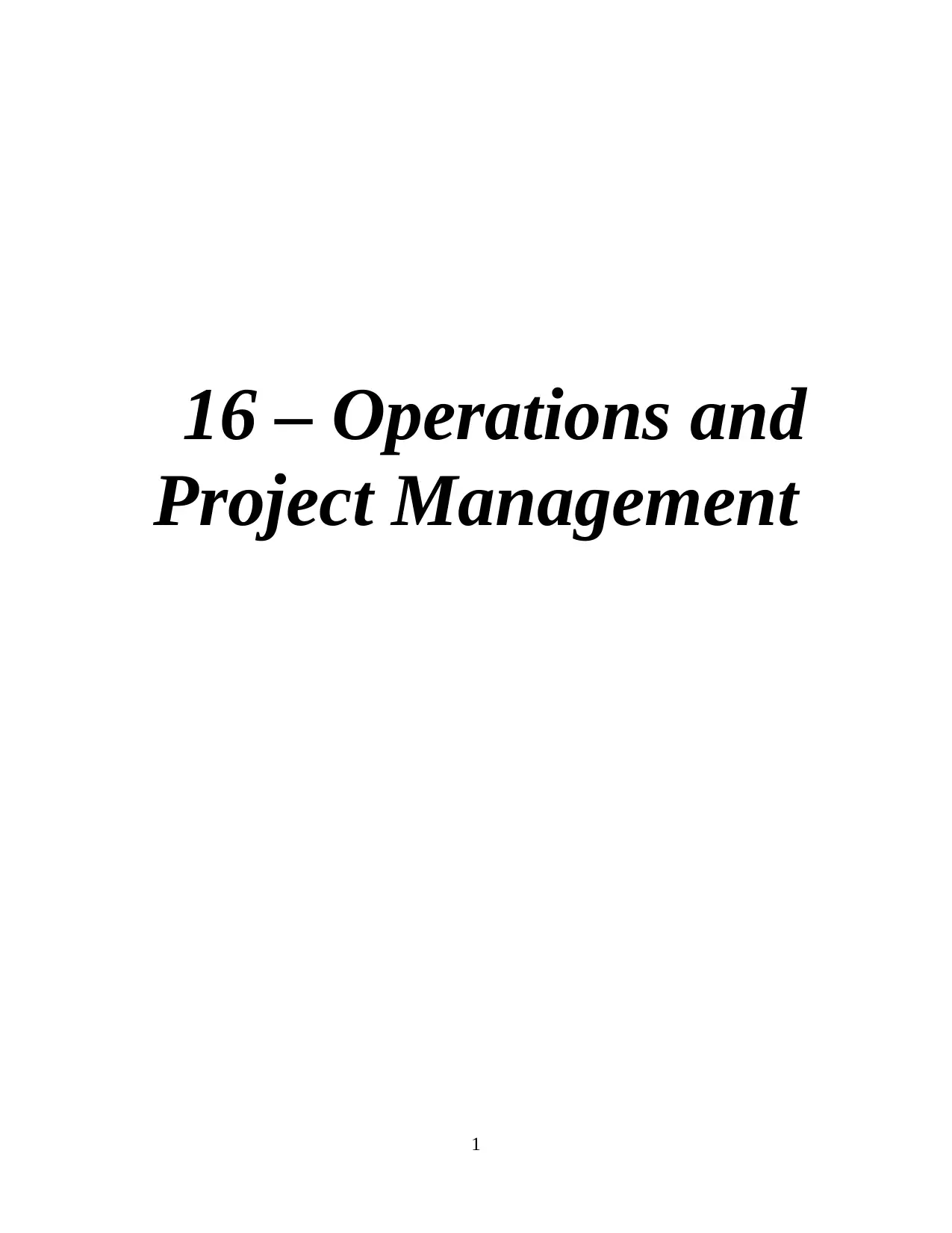
16 – Operations and
Project Management
1
Project Management
1
Paraphrase This Document
Need a fresh take? Get an instant paraphrase of this document with our AI Paraphraser
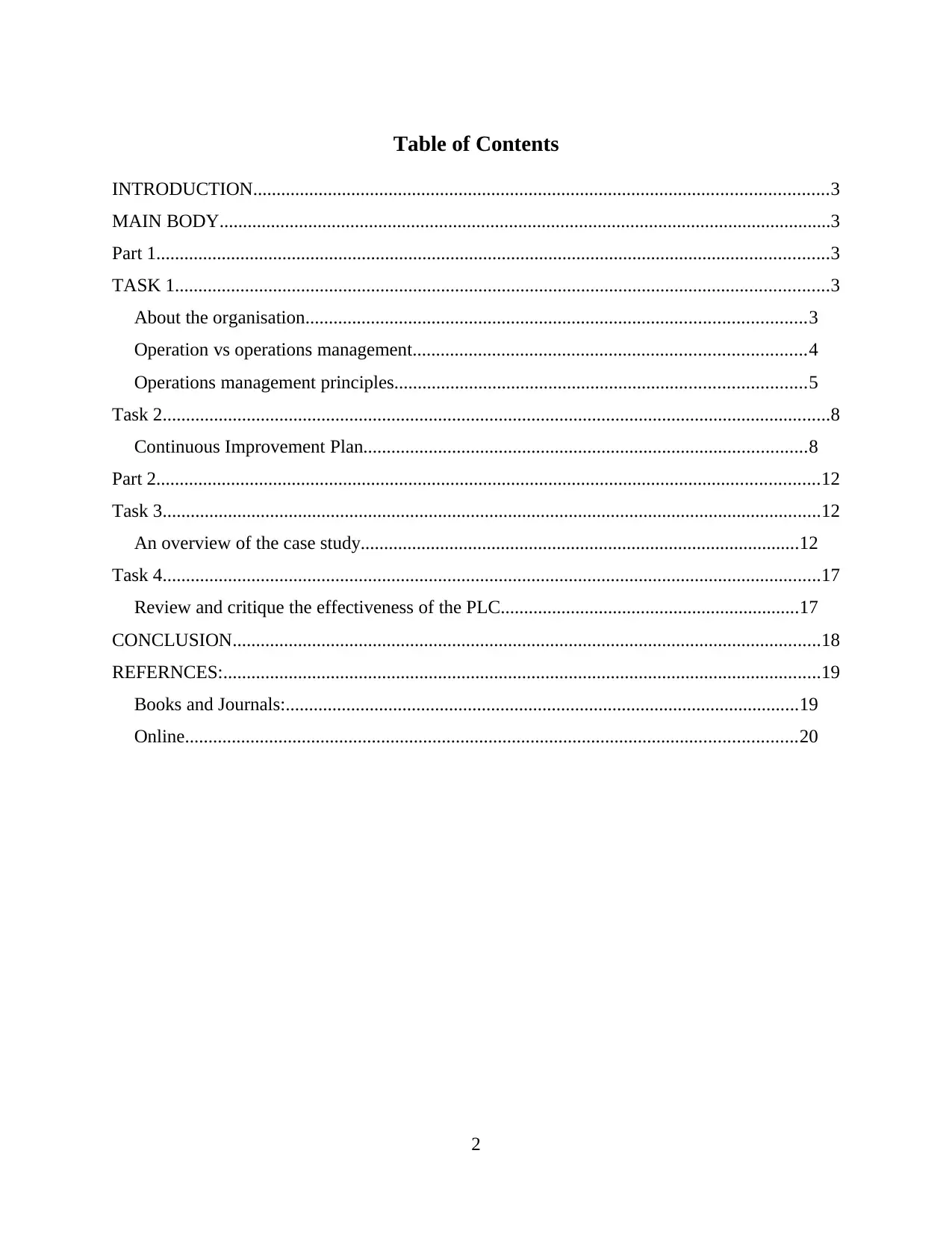
Table of Contents
INTRODUCTION...........................................................................................................................3
MAIN BODY...................................................................................................................................3
Part 1................................................................................................................................................3
TASK 1............................................................................................................................................3
About the organisation...........................................................................................................3
Operation vs operations management....................................................................................4
Operations management principles........................................................................................5
Task 2...............................................................................................................................................8
Continuous Improvement Plan...............................................................................................8
Part 2..............................................................................................................................................12
Task 3.............................................................................................................................................12
An overview of the case study..............................................................................................12
Task 4.............................................................................................................................................17
Review and critique the effectiveness of the PLC................................................................17
CONCLUSION..............................................................................................................................18
REFERNCES:................................................................................................................................19
Books and Journals:..............................................................................................................19
Online...................................................................................................................................20
2
INTRODUCTION...........................................................................................................................3
MAIN BODY...................................................................................................................................3
Part 1................................................................................................................................................3
TASK 1............................................................................................................................................3
About the organisation...........................................................................................................3
Operation vs operations management....................................................................................4
Operations management principles........................................................................................5
Task 2...............................................................................................................................................8
Continuous Improvement Plan...............................................................................................8
Part 2..............................................................................................................................................12
Task 3.............................................................................................................................................12
An overview of the case study..............................................................................................12
Task 4.............................................................................................................................................17
Review and critique the effectiveness of the PLC................................................................17
CONCLUSION..............................................................................................................................18
REFERNCES:................................................................................................................................19
Books and Journals:..............................................................................................................19
Online...................................................................................................................................20
2
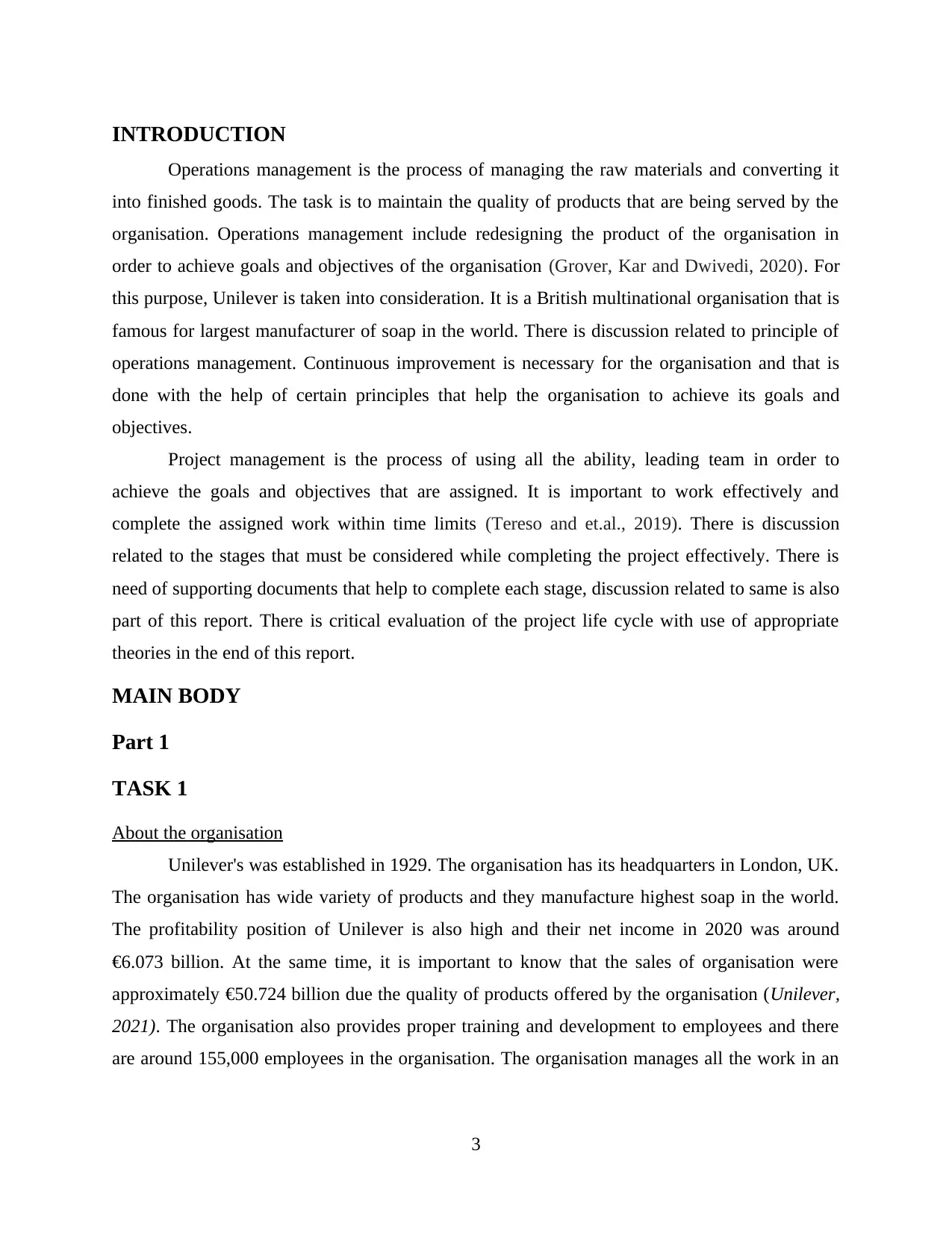
INTRODUCTION
Operations management is the process of managing the raw materials and converting it
into finished goods. The task is to maintain the quality of products that are being served by the
organisation. Operations management include redesigning the product of the organisation in
order to achieve goals and objectives of the organisation (Grover, Kar and Dwivedi, 2020). For
this purpose, Unilever is taken into consideration. It is a British multinational organisation that is
famous for largest manufacturer of soap in the world. There is discussion related to principle of
operations management. Continuous improvement is necessary for the organisation and that is
done with the help of certain principles that help the organisation to achieve its goals and
objectives.
Project management is the process of using all the ability, leading team in order to
achieve the goals and objectives that are assigned. It is important to work effectively and
complete the assigned work within time limits (Tereso and et.al., 2019). There is discussion
related to the stages that must be considered while completing the project effectively. There is
need of supporting documents that help to complete each stage, discussion related to same is also
part of this report. There is critical evaluation of the project life cycle with use of appropriate
theories in the end of this report.
MAIN BODY
Part 1
TASK 1
About the organisation
Unilever's was established in 1929. The organisation has its headquarters in London, UK.
The organisation has wide variety of products and they manufacture highest soap in the world.
The profitability position of Unilever is also high and their net income in 2020 was around
€6.073 billion. At the same time, it is important to know that the sales of organisation were
approximately €50.724 billion due the quality of products offered by the organisation (Unilever,
2021). The organisation also provides proper training and development to employees and there
are around 155,000 employees in the organisation. The organisation manages all the work in an
3
Operations management is the process of managing the raw materials and converting it
into finished goods. The task is to maintain the quality of products that are being served by the
organisation. Operations management include redesigning the product of the organisation in
order to achieve goals and objectives of the organisation (Grover, Kar and Dwivedi, 2020). For
this purpose, Unilever is taken into consideration. It is a British multinational organisation that is
famous for largest manufacturer of soap in the world. There is discussion related to principle of
operations management. Continuous improvement is necessary for the organisation and that is
done with the help of certain principles that help the organisation to achieve its goals and
objectives.
Project management is the process of using all the ability, leading team in order to
achieve the goals and objectives that are assigned. It is important to work effectively and
complete the assigned work within time limits (Tereso and et.al., 2019). There is discussion
related to the stages that must be considered while completing the project effectively. There is
need of supporting documents that help to complete each stage, discussion related to same is also
part of this report. There is critical evaluation of the project life cycle with use of appropriate
theories in the end of this report.
MAIN BODY
Part 1
TASK 1
About the organisation
Unilever's was established in 1929. The organisation has its headquarters in London, UK.
The organisation has wide variety of products and they manufacture highest soap in the world.
The profitability position of Unilever is also high and their net income in 2020 was around
€6.073 billion. At the same time, it is important to know that the sales of organisation were
approximately €50.724 billion due the quality of products offered by the organisation (Unilever,
2021). The organisation also provides proper training and development to employees and there
are around 155,000 employees in the organisation. The organisation manages all the work in an
3
⊘ This is a preview!⊘
Do you want full access?
Subscribe today to unlock all pages.

Trusted by 1+ million students worldwide
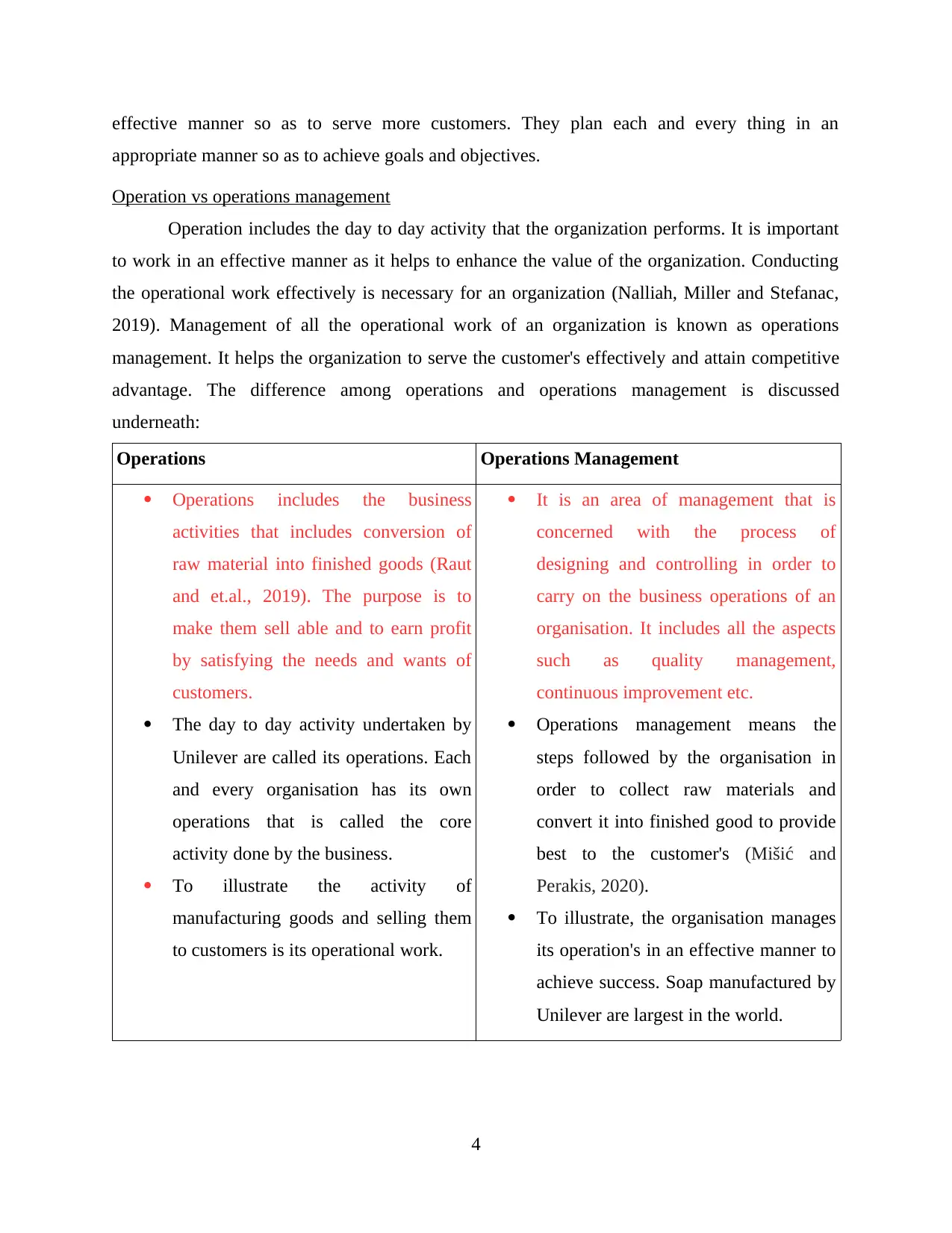
effective manner so as to serve more customers. They plan each and every thing in an
appropriate manner so as to achieve goals and objectives.
Operation vs operations management
Operation includes the day to day activity that the organization performs. It is important
to work in an effective manner as it helps to enhance the value of the organization. Conducting
the operational work effectively is necessary for an organization (Nalliah, Miller and Stefanac,
2019). Management of all the operational work of an organization is known as operations
management. It helps the organization to serve the customer's effectively and attain competitive
advantage. The difference among operations and operations management is discussed
underneath:
Operations Operations Management
Operations includes the business
activities that includes conversion of
raw material into finished goods (Raut
and et.al., 2019). The purpose is to
make them sell able and to earn profit
by satisfying the needs and wants of
customers.
The day to day activity undertaken by
Unilever are called its operations. Each
and every organisation has its own
operations that is called the core
activity done by the business.
To illustrate the activity of
manufacturing goods and selling them
to customers is its operational work.
It is an area of management that is
concerned with the process of
designing and controlling in order to
carry on the business operations of an
organisation. It includes all the aspects
such as quality management,
continuous improvement etc.
Operations management means the
steps followed by the organisation in
order to collect raw materials and
convert it into finished good to provide
best to the customer's (Mišić and
Perakis, 2020).
To illustrate, the organisation manages
its operation's in an effective manner to
achieve success. Soap manufactured by
Unilever are largest in the world.
4
appropriate manner so as to achieve goals and objectives.
Operation vs operations management
Operation includes the day to day activity that the organization performs. It is important
to work in an effective manner as it helps to enhance the value of the organization. Conducting
the operational work effectively is necessary for an organization (Nalliah, Miller and Stefanac,
2019). Management of all the operational work of an organization is known as operations
management. It helps the organization to serve the customer's effectively and attain competitive
advantage. The difference among operations and operations management is discussed
underneath:
Operations Operations Management
Operations includes the business
activities that includes conversion of
raw material into finished goods (Raut
and et.al., 2019). The purpose is to
make them sell able and to earn profit
by satisfying the needs and wants of
customers.
The day to day activity undertaken by
Unilever are called its operations. Each
and every organisation has its own
operations that is called the core
activity done by the business.
To illustrate the activity of
manufacturing goods and selling them
to customers is its operational work.
It is an area of management that is
concerned with the process of
designing and controlling in order to
carry on the business operations of an
organisation. It includes all the aspects
such as quality management,
continuous improvement etc.
Operations management means the
steps followed by the organisation in
order to collect raw materials and
convert it into finished good to provide
best to the customer's (Mišić and
Perakis, 2020).
To illustrate, the organisation manages
its operation's in an effective manner to
achieve success. Soap manufactured by
Unilever are largest in the world.
4
Paraphrase This Document
Need a fresh take? Get an instant paraphrase of this document with our AI Paraphraser
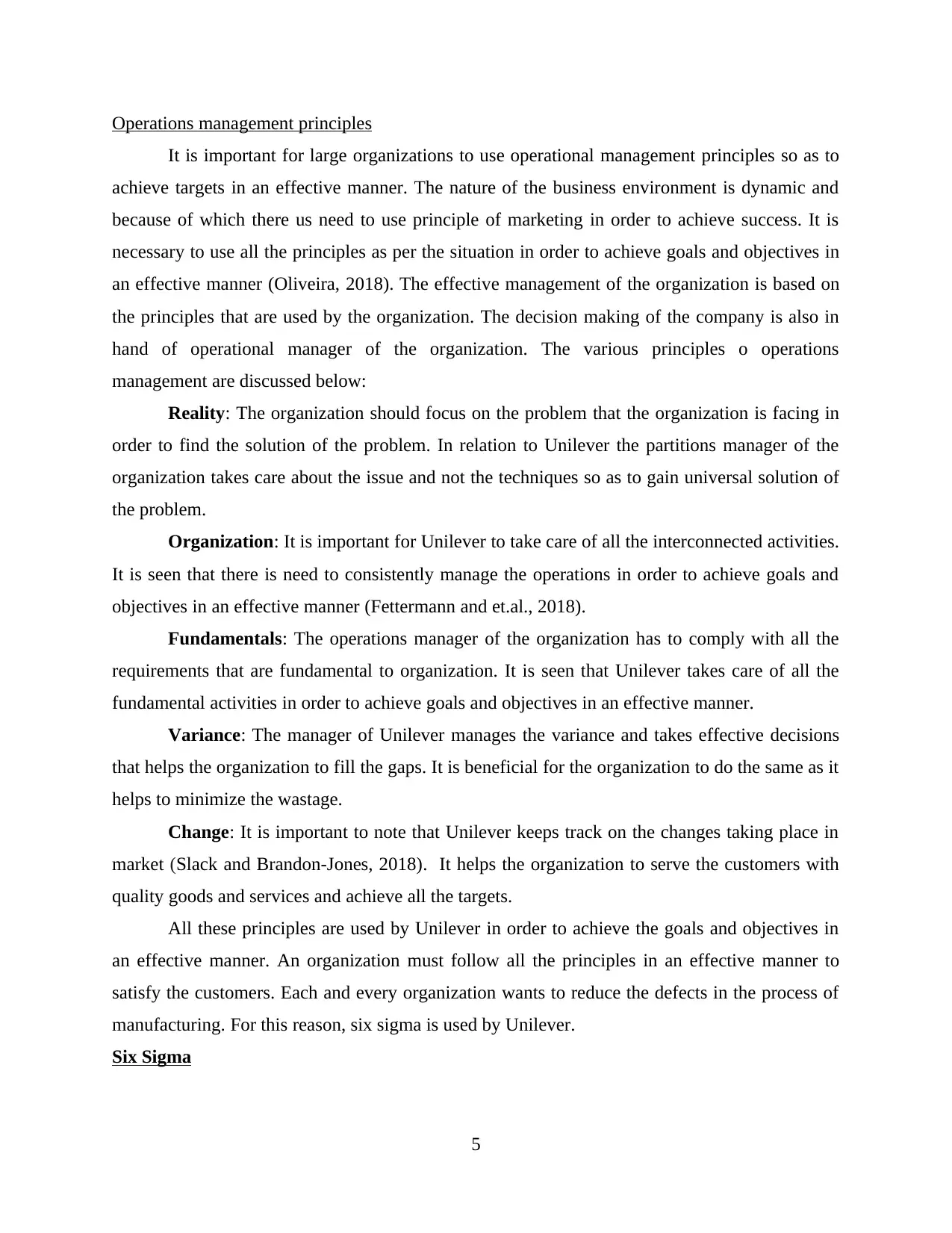
Operations management principles
It is important for large organizations to use operational management principles so as to
achieve targets in an effective manner. The nature of the business environment is dynamic and
because of which there us need to use principle of marketing in order to achieve success. It is
necessary to use all the principles as per the situation in order to achieve goals and objectives in
an effective manner (Oliveira, 2018). The effective management of the organization is based on
the principles that are used by the organization. The decision making of the company is also in
hand of operational manager of the organization. The various principles o operations
management are discussed below:
Reality: The organization should focus on the problem that the organization is facing in
order to find the solution of the problem. In relation to Unilever the partitions manager of the
organization takes care about the issue and not the techniques so as to gain universal solution of
the problem.
Organization: It is important for Unilever to take care of all the interconnected activities.
It is seen that there is need to consistently manage the operations in order to achieve goals and
objectives in an effective manner (Fettermann and et.al., 2018).
Fundamentals: The operations manager of the organization has to comply with all the
requirements that are fundamental to organization. It is seen that Unilever takes care of all the
fundamental activities in order to achieve goals and objectives in an effective manner.
Variance: The manager of Unilever manages the variance and takes effective decisions
that helps the organization to fill the gaps. It is beneficial for the organization to do the same as it
helps to minimize the wastage.
Change: It is important to note that Unilever keeps track on the changes taking place in
market (Slack and Brandon-Jones, 2018). It helps the organization to serve the customers with
quality goods and services and achieve all the targets.
All these principles are used by Unilever in order to achieve the goals and objectives in
an effective manner. An organization must follow all the principles in an effective manner to
satisfy the customers. Each and every organization wants to reduce the defects in the process of
manufacturing. For this reason, six sigma is used by Unilever.
Six Sigma
5
It is important for large organizations to use operational management principles so as to
achieve targets in an effective manner. The nature of the business environment is dynamic and
because of which there us need to use principle of marketing in order to achieve success. It is
necessary to use all the principles as per the situation in order to achieve goals and objectives in
an effective manner (Oliveira, 2018). The effective management of the organization is based on
the principles that are used by the organization. The decision making of the company is also in
hand of operational manager of the organization. The various principles o operations
management are discussed below:
Reality: The organization should focus on the problem that the organization is facing in
order to find the solution of the problem. In relation to Unilever the partitions manager of the
organization takes care about the issue and not the techniques so as to gain universal solution of
the problem.
Organization: It is important for Unilever to take care of all the interconnected activities.
It is seen that there is need to consistently manage the operations in order to achieve goals and
objectives in an effective manner (Fettermann and et.al., 2018).
Fundamentals: The operations manager of the organization has to comply with all the
requirements that are fundamental to organization. It is seen that Unilever takes care of all the
fundamental activities in order to achieve goals and objectives in an effective manner.
Variance: The manager of Unilever manages the variance and takes effective decisions
that helps the organization to fill the gaps. It is beneficial for the organization to do the same as it
helps to minimize the wastage.
Change: It is important to note that Unilever keeps track on the changes taking place in
market (Slack and Brandon-Jones, 2018). It helps the organization to serve the customers with
quality goods and services and achieve all the targets.
All these principles are used by Unilever in order to achieve the goals and objectives in
an effective manner. An organization must follow all the principles in an effective manner to
satisfy the customers. Each and every organization wants to reduce the defects in the process of
manufacturing. For this reason, six sigma is used by Unilever.
Six Sigma
5
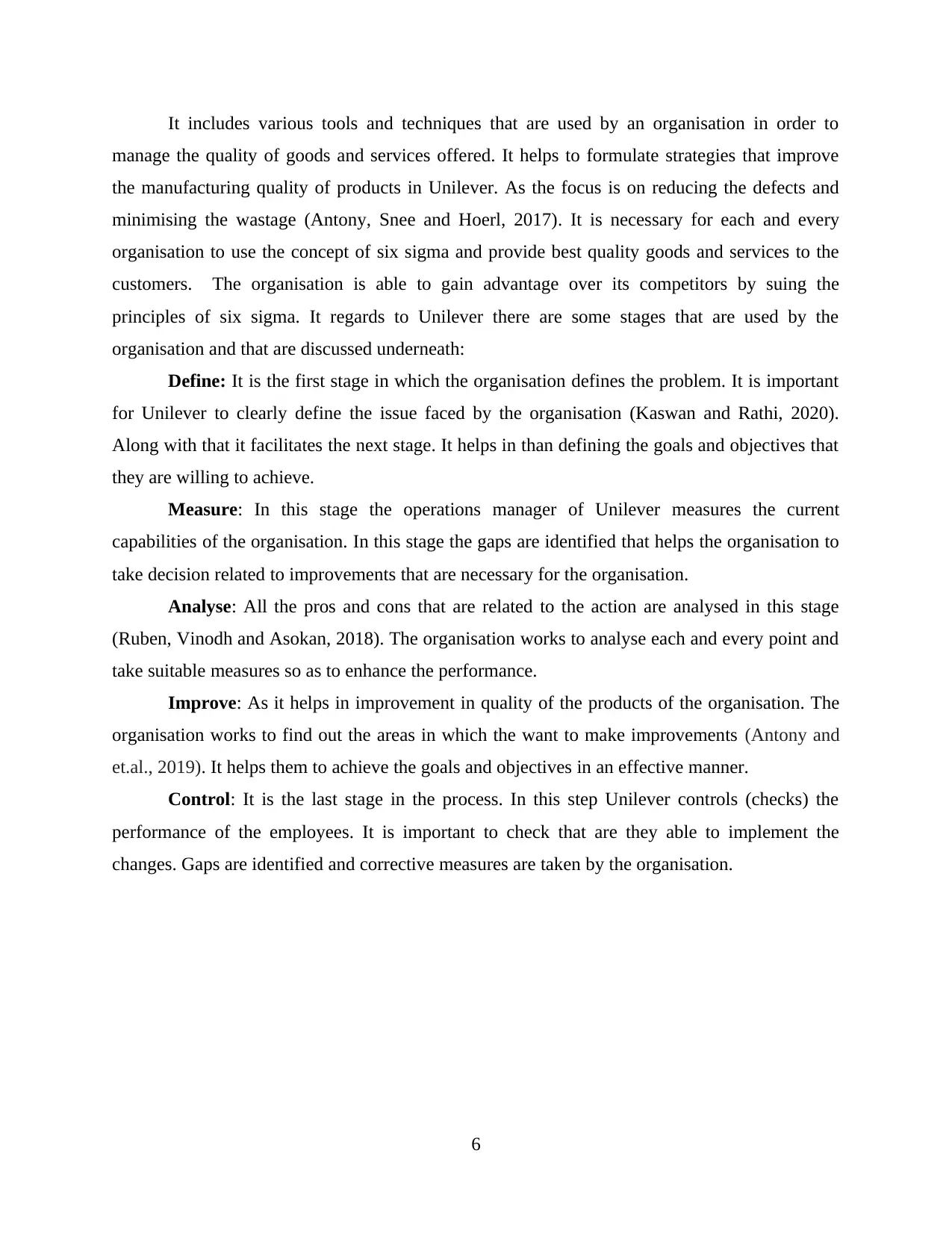
It includes various tools and techniques that are used by an organisation in order to
manage the quality of goods and services offered. It helps to formulate strategies that improve
the manufacturing quality of products in Unilever. As the focus is on reducing the defects and
minimising the wastage (Antony, Snee and Hoerl, 2017). It is necessary for each and every
organisation to use the concept of six sigma and provide best quality goods and services to the
customers. The organisation is able to gain advantage over its competitors by suing the
principles of six sigma. It regards to Unilever there are some stages that are used by the
organisation and that are discussed underneath:
Define: It is the first stage in which the organisation defines the problem. It is important
for Unilever to clearly define the issue faced by the organisation (Kaswan and Rathi, 2020).
Along with that it facilitates the next stage. It helps in than defining the goals and objectives that
they are willing to achieve.
Measure: In this stage the operations manager of Unilever measures the current
capabilities of the organisation. In this stage the gaps are identified that helps the organisation to
take decision related to improvements that are necessary for the organisation.
Analyse: All the pros and cons that are related to the action are analysed in this stage
(Ruben, Vinodh and Asokan, 2018). The organisation works to analyse each and every point and
take suitable measures so as to enhance the performance.
Improve: As it helps in improvement in quality of the products of the organisation. The
organisation works to find out the areas in which the want to make improvements (Antony and
et.al., 2019). It helps them to achieve the goals and objectives in an effective manner.
Control: It is the last stage in the process. In this step Unilever controls (checks) the
performance of the employees. It is important to check that are they able to implement the
changes. Gaps are identified and corrective measures are taken by the organisation.
6
manage the quality of goods and services offered. It helps to formulate strategies that improve
the manufacturing quality of products in Unilever. As the focus is on reducing the defects and
minimising the wastage (Antony, Snee and Hoerl, 2017). It is necessary for each and every
organisation to use the concept of six sigma and provide best quality goods and services to the
customers. The organisation is able to gain advantage over its competitors by suing the
principles of six sigma. It regards to Unilever there are some stages that are used by the
organisation and that are discussed underneath:
Define: It is the first stage in which the organisation defines the problem. It is important
for Unilever to clearly define the issue faced by the organisation (Kaswan and Rathi, 2020).
Along with that it facilitates the next stage. It helps in than defining the goals and objectives that
they are willing to achieve.
Measure: In this stage the operations manager of Unilever measures the current
capabilities of the organisation. In this stage the gaps are identified that helps the organisation to
take decision related to improvements that are necessary for the organisation.
Analyse: All the pros and cons that are related to the action are analysed in this stage
(Ruben, Vinodh and Asokan, 2018). The organisation works to analyse each and every point and
take suitable measures so as to enhance the performance.
Improve: As it helps in improvement in quality of the products of the organisation. The
organisation works to find out the areas in which the want to make improvements (Antony and
et.al., 2019). It helps them to achieve the goals and objectives in an effective manner.
Control: It is the last stage in the process. In this step Unilever controls (checks) the
performance of the employees. It is important to check that are they able to implement the
changes. Gaps are identified and corrective measures are taken by the organisation.
6
⊘ This is a preview!⊘
Do you want full access?
Subscribe today to unlock all pages.

Trusted by 1+ million students worldwide
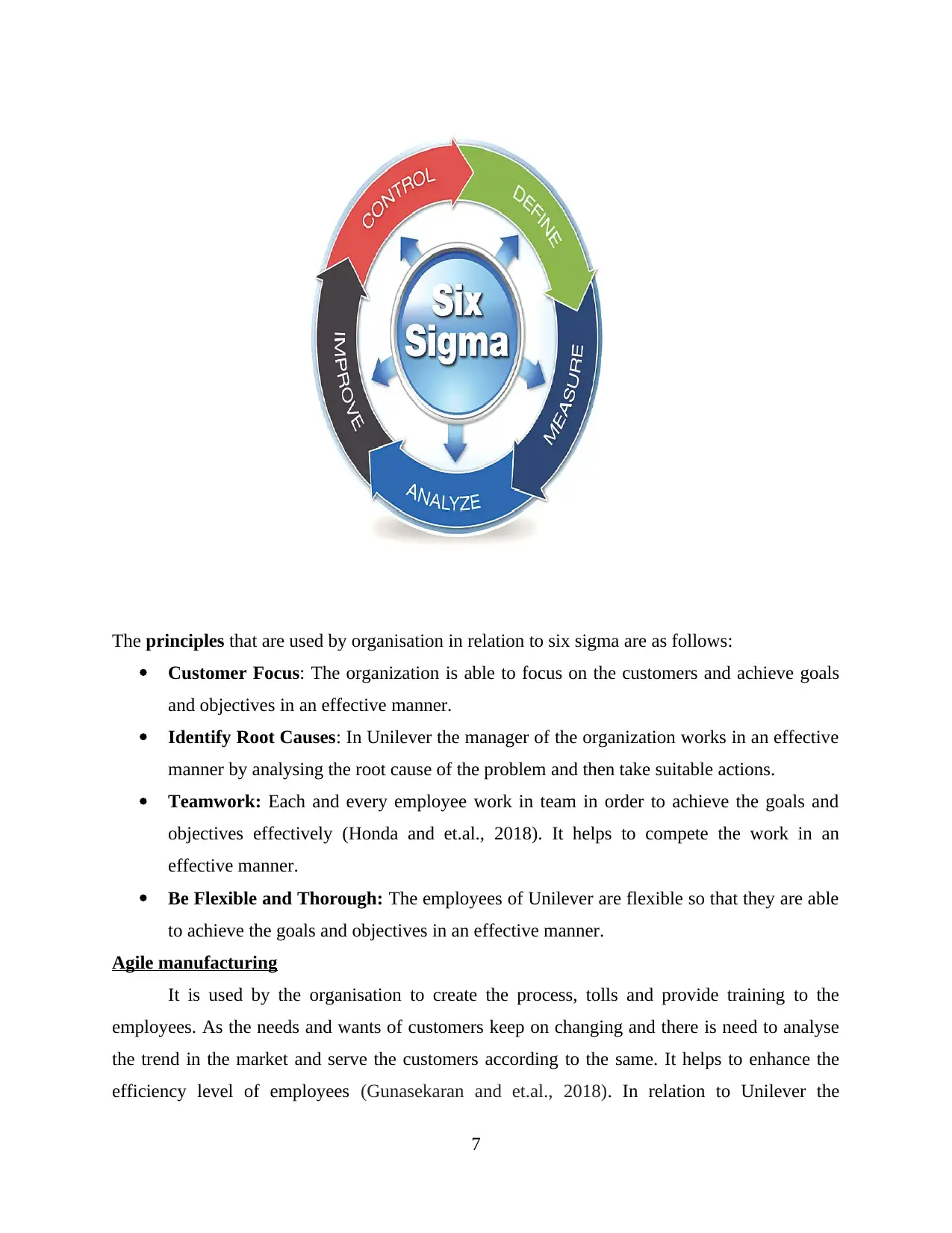
The principles that are used by organisation in relation to six sigma are as follows:
Customer Focus: The organization is able to focus on the customers and achieve goals
and objectives in an effective manner.
Identify Root Causes: In Unilever the manager of the organization works in an effective
manner by analysing the root cause of the problem and then take suitable actions.
Teamwork: Each and every employee work in team in order to achieve the goals and
objectives effectively (Honda and et.al., 2018). It helps to compete the work in an
effective manner.
Be Flexible and Thorough: The employees of Unilever are flexible so that they are able
to achieve the goals and objectives in an effective manner.
Agile manufacturing
It is used by the organisation to create the process, tolls and provide training to the
employees. As the needs and wants of customers keep on changing and there is need to analyse
the trend in the market and serve the customers according to the same. It helps to enhance the
efficiency level of employees (Gunasekaran and et.al., 2018). In relation to Unilever the
7
Customer Focus: The organization is able to focus on the customers and achieve goals
and objectives in an effective manner.
Identify Root Causes: In Unilever the manager of the organization works in an effective
manner by analysing the root cause of the problem and then take suitable actions.
Teamwork: Each and every employee work in team in order to achieve the goals and
objectives effectively (Honda and et.al., 2018). It helps to compete the work in an
effective manner.
Be Flexible and Thorough: The employees of Unilever are flexible so that they are able
to achieve the goals and objectives in an effective manner.
Agile manufacturing
It is used by the organisation to create the process, tolls and provide training to the
employees. As the needs and wants of customers keep on changing and there is need to analyse
the trend in the market and serve the customers according to the same. It helps to enhance the
efficiency level of employees (Gunasekaran and et.al., 2018). In relation to Unilever the
7
Paraphrase This Document
Need a fresh take? Get an instant paraphrase of this document with our AI Paraphraser
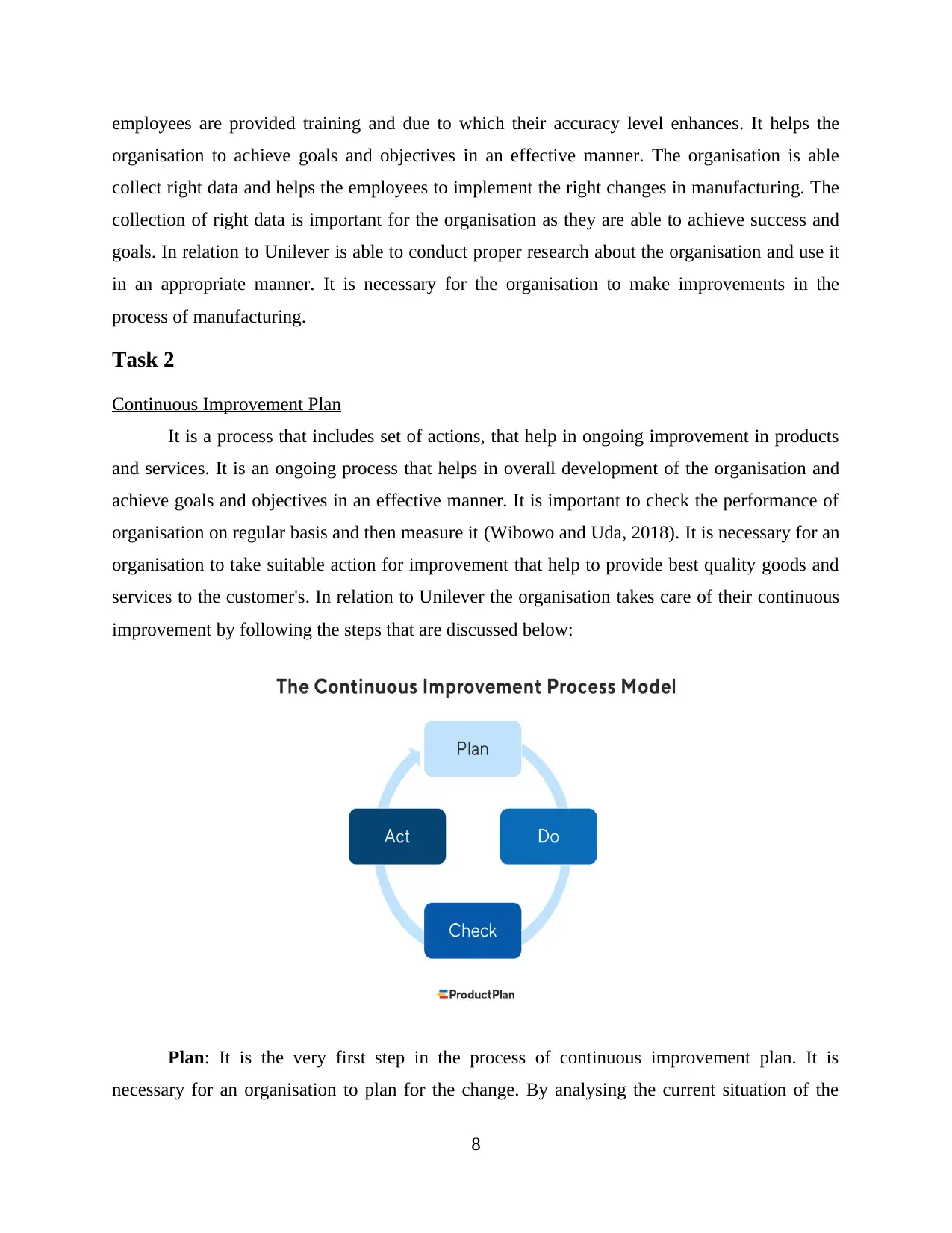
employees are provided training and due to which their accuracy level enhances. It helps the
organisation to achieve goals and objectives in an effective manner. The organisation is able
collect right data and helps the employees to implement the right changes in manufacturing. The
collection of right data is important for the organisation as they are able to achieve success and
goals. In relation to Unilever is able to conduct proper research about the organisation and use it
in an appropriate manner. It is necessary for the organisation to make improvements in the
process of manufacturing.
Task 2
Continuous Improvement Plan
It is a process that includes set of actions, that help in ongoing improvement in products
and services. It is an ongoing process that helps in overall development of the organisation and
achieve goals and objectives in an effective manner. It is important to check the performance of
organisation on regular basis and then measure it (Wibowo and Uda, 2018). It is necessary for an
organisation to take suitable action for improvement that help to provide best quality goods and
services to the customer's. In relation to Unilever the organisation takes care of their continuous
improvement by following the steps that are discussed below:
Plan: It is the very first step in the process of continuous improvement plan. It is
necessary for an organisation to plan for the change. By analysing the current situation of the
8
organisation to achieve goals and objectives in an effective manner. The organisation is able
collect right data and helps the employees to implement the right changes in manufacturing. The
collection of right data is important for the organisation as they are able to achieve success and
goals. In relation to Unilever is able to conduct proper research about the organisation and use it
in an appropriate manner. It is necessary for the organisation to make improvements in the
process of manufacturing.
Task 2
Continuous Improvement Plan
It is a process that includes set of actions, that help in ongoing improvement in products
and services. It is an ongoing process that helps in overall development of the organisation and
achieve goals and objectives in an effective manner. It is important to check the performance of
organisation on regular basis and then measure it (Wibowo and Uda, 2018). It is necessary for an
organisation to take suitable action for improvement that help to provide best quality goods and
services to the customer's. In relation to Unilever the organisation takes care of their continuous
improvement by following the steps that are discussed below:
Plan: It is the very first step in the process of continuous improvement plan. It is
necessary for an organisation to plan for the change. By analysing the current situation of the
8
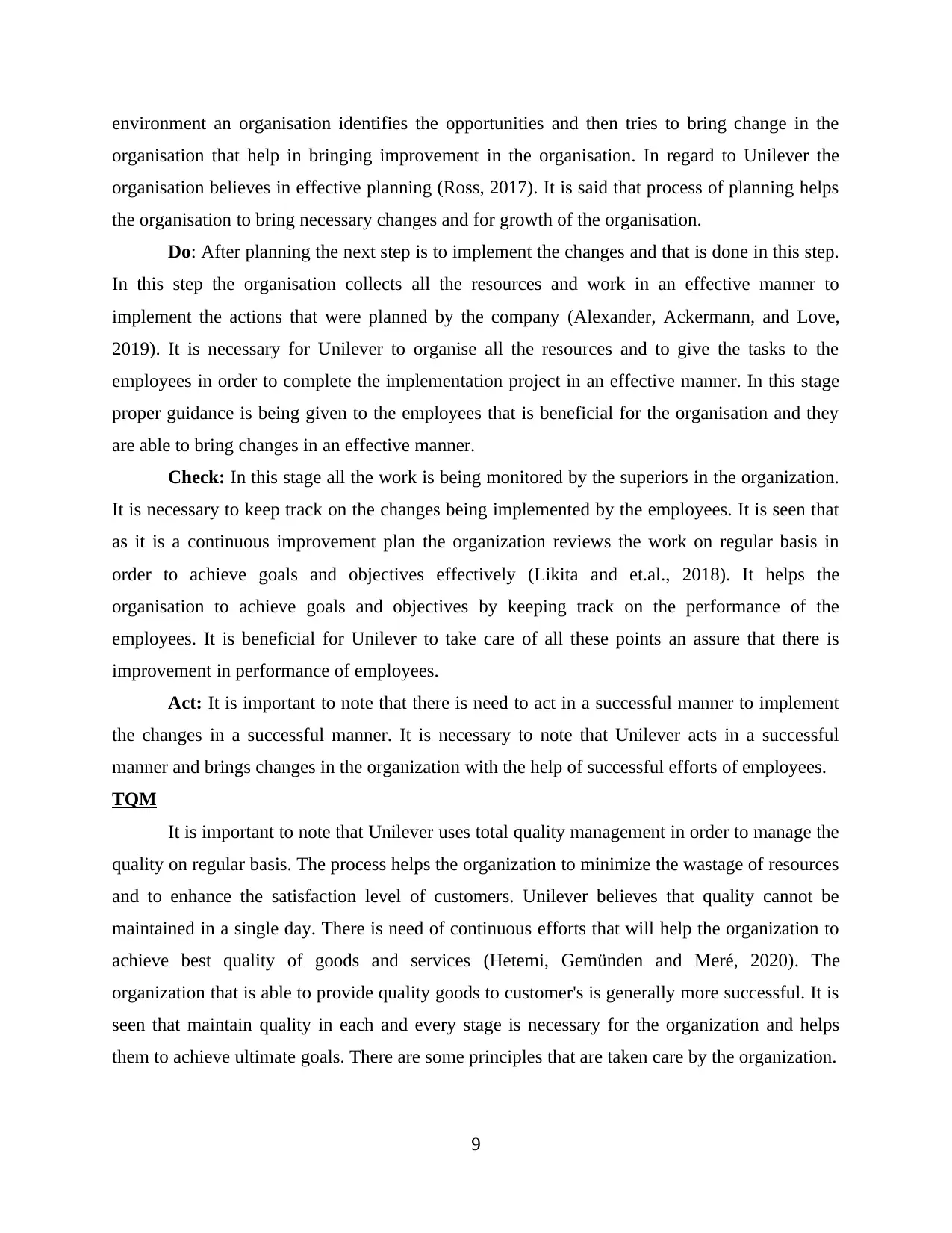
environment an organisation identifies the opportunities and then tries to bring change in the
organisation that help in bringing improvement in the organisation. In regard to Unilever the
organisation believes in effective planning (Ross, 2017). It is said that process of planning helps
the organisation to bring necessary changes and for growth of the organisation.
Do: After planning the next step is to implement the changes and that is done in this step.
In this step the organisation collects all the resources and work in an effective manner to
implement the actions that were planned by the company (Alexander, Ackermann, and Love,
2019). It is necessary for Unilever to organise all the resources and to give the tasks to the
employees in order to complete the implementation project in an effective manner. In this stage
proper guidance is being given to the employees that is beneficial for the organisation and they
are able to bring changes in an effective manner.
Check: In this stage all the work is being monitored by the superiors in the organization.
It is necessary to keep track on the changes being implemented by the employees. It is seen that
as it is a continuous improvement plan the organization reviews the work on regular basis in
order to achieve goals and objectives effectively (Likita and et.al., 2018). It helps the
organisation to achieve goals and objectives by keeping track on the performance of the
employees. It is beneficial for Unilever to take care of all these points an assure that there is
improvement in performance of employees.
Act: It is important to note that there is need to act in a successful manner to implement
the changes in a successful manner. It is necessary to note that Unilever acts in a successful
manner and brings changes in the organization with the help of successful efforts of employees.
TQM
It is important to note that Unilever uses total quality management in order to manage the
quality on regular basis. The process helps the organization to minimize the wastage of resources
and to enhance the satisfaction level of customers. Unilever believes that quality cannot be
maintained in a single day. There is need of continuous efforts that will help the organization to
achieve best quality of goods and services (Hetemi, Gemünden and Meré, 2020). The
organization that is able to provide quality goods to customer's is generally more successful. It is
seen that maintain quality in each and every stage is necessary for the organization and helps
them to achieve ultimate goals. There are some principles that are taken care by the organization.
9
organisation that help in bringing improvement in the organisation. In regard to Unilever the
organisation believes in effective planning (Ross, 2017). It is said that process of planning helps
the organisation to bring necessary changes and for growth of the organisation.
Do: After planning the next step is to implement the changes and that is done in this step.
In this step the organisation collects all the resources and work in an effective manner to
implement the actions that were planned by the company (Alexander, Ackermann, and Love,
2019). It is necessary for Unilever to organise all the resources and to give the tasks to the
employees in order to complete the implementation project in an effective manner. In this stage
proper guidance is being given to the employees that is beneficial for the organisation and they
are able to bring changes in an effective manner.
Check: In this stage all the work is being monitored by the superiors in the organization.
It is necessary to keep track on the changes being implemented by the employees. It is seen that
as it is a continuous improvement plan the organization reviews the work on regular basis in
order to achieve goals and objectives effectively (Likita and et.al., 2018). It helps the
organisation to achieve goals and objectives by keeping track on the performance of the
employees. It is beneficial for Unilever to take care of all these points an assure that there is
improvement in performance of employees.
Act: It is important to note that there is need to act in a successful manner to implement
the changes in a successful manner. It is necessary to note that Unilever acts in a successful
manner and brings changes in the organization with the help of successful efforts of employees.
TQM
It is important to note that Unilever uses total quality management in order to manage the
quality on regular basis. The process helps the organization to minimize the wastage of resources
and to enhance the satisfaction level of customers. Unilever believes that quality cannot be
maintained in a single day. There is need of continuous efforts that will help the organization to
achieve best quality of goods and services (Hetemi, Gemünden and Meré, 2020). The
organization that is able to provide quality goods to customer's is generally more successful. It is
seen that maintain quality in each and every stage is necessary for the organization and helps
them to achieve ultimate goals. There are some principles that are taken care by the organization.
9
⊘ This is a preview!⊘
Do you want full access?
Subscribe today to unlock all pages.

Trusted by 1+ million students worldwide
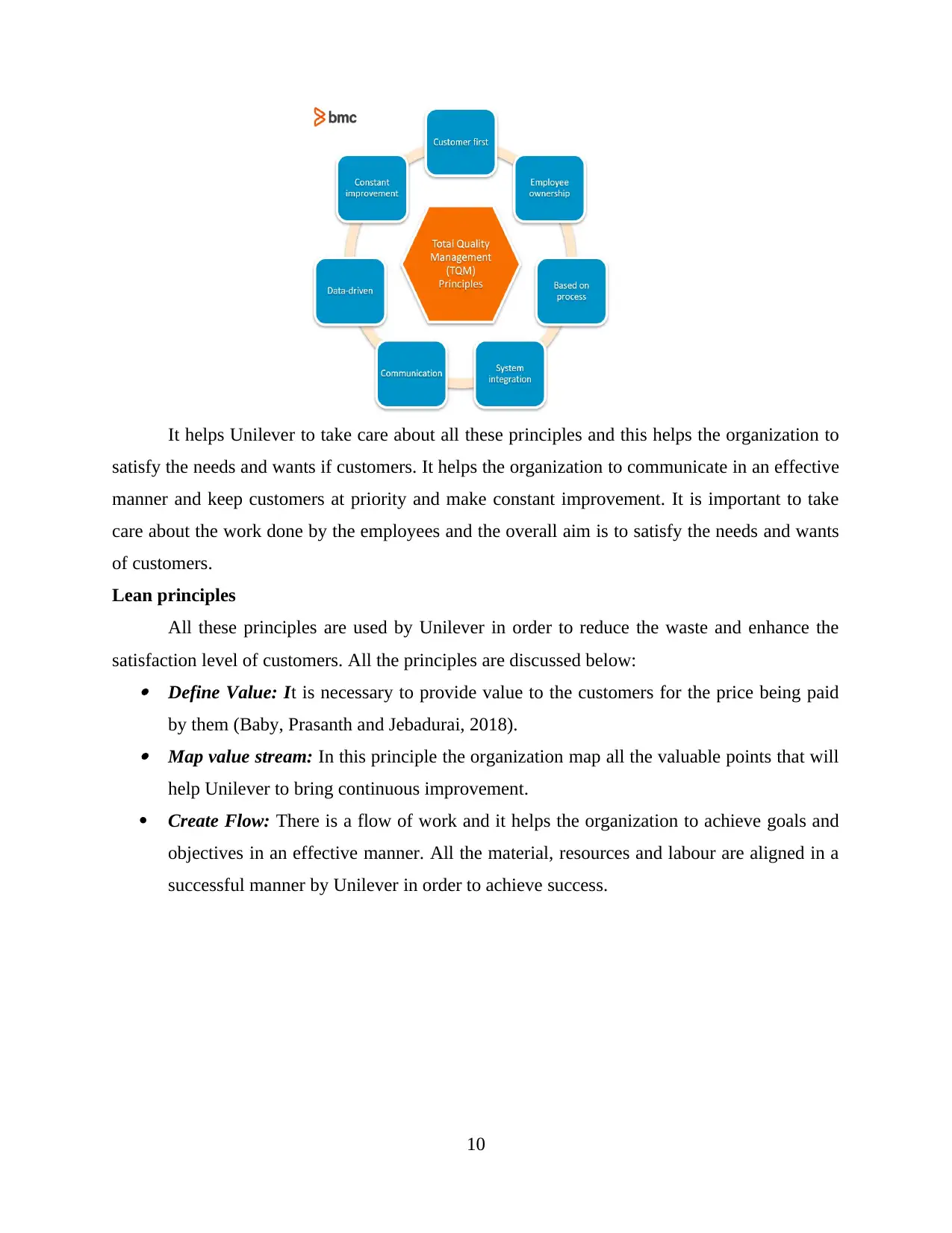
It helps Unilever to take care about all these principles and this helps the organization to
satisfy the needs and wants if customers. It helps the organization to communicate in an effective
manner and keep customers at priority and make constant improvement. It is important to take
care about the work done by the employees and the overall aim is to satisfy the needs and wants
of customers.
Lean principles
All these principles are used by Unilever in order to reduce the waste and enhance the
satisfaction level of customers. All the principles are discussed below: Define Value: It is necessary to provide value to the customers for the price being paid
by them (Baby, Prasanth and Jebadurai, 2018). Map value stream: In this principle the organization map all the valuable points that will
help Unilever to bring continuous improvement.
Create Flow: There is a flow of work and it helps the organization to achieve goals and
objectives in an effective manner. All the material, resources and labour are aligned in a
successful manner by Unilever in order to achieve success.
10
satisfy the needs and wants if customers. It helps the organization to communicate in an effective
manner and keep customers at priority and make constant improvement. It is important to take
care about the work done by the employees and the overall aim is to satisfy the needs and wants
of customers.
Lean principles
All these principles are used by Unilever in order to reduce the waste and enhance the
satisfaction level of customers. All the principles are discussed below: Define Value: It is necessary to provide value to the customers for the price being paid
by them (Baby, Prasanth and Jebadurai, 2018). Map value stream: In this principle the organization map all the valuable points that will
help Unilever to bring continuous improvement.
Create Flow: There is a flow of work and it helps the organization to achieve goals and
objectives in an effective manner. All the material, resources and labour are aligned in a
successful manner by Unilever in order to achieve success.
10
Paraphrase This Document
Need a fresh take? Get an instant paraphrase of this document with our AI Paraphraser
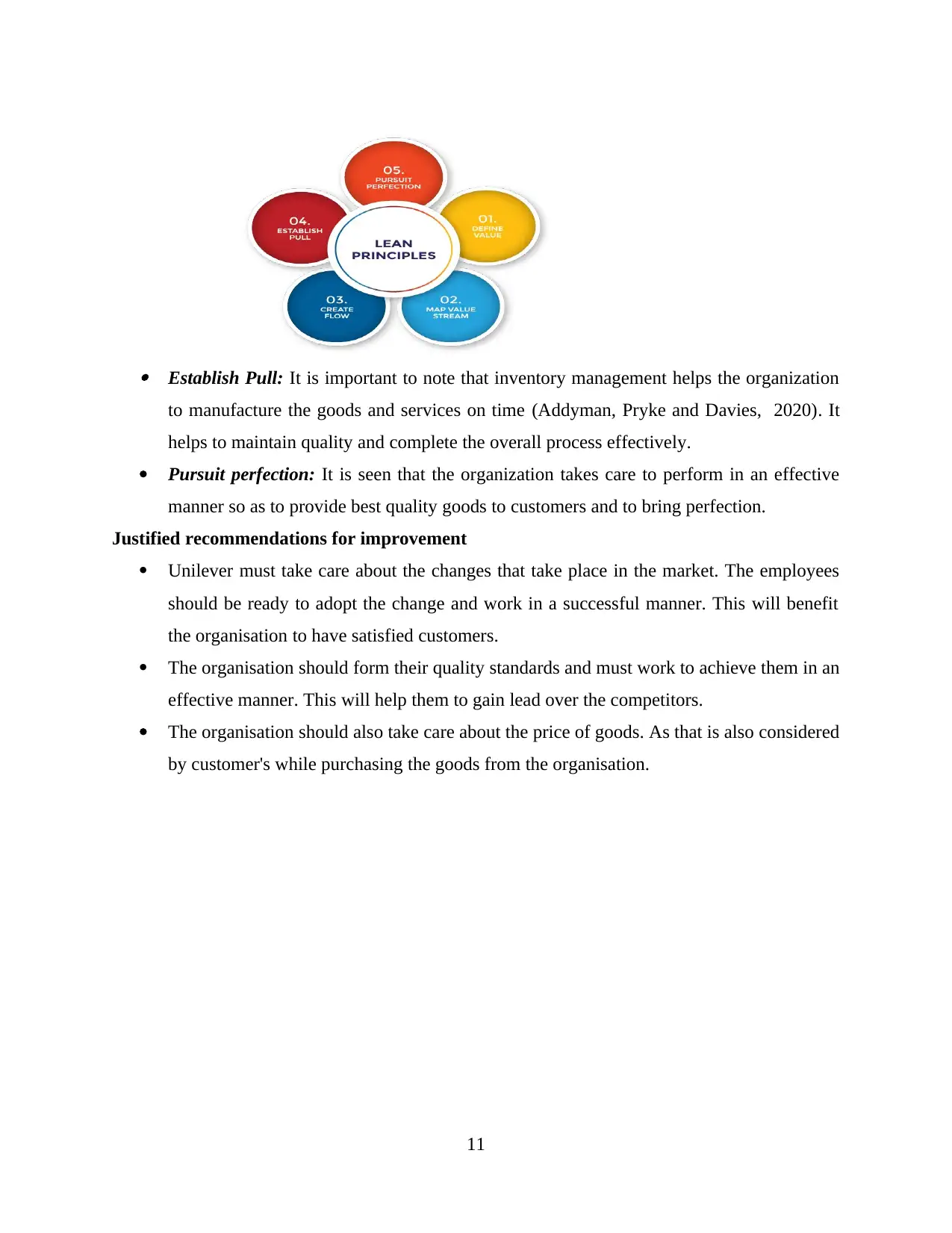
Establish Pull: It is important to note that inventory management helps the organization
to manufacture the goods and services on time (Addyman, Pryke and Davies, 2020). It
helps to maintain quality and complete the overall process effectively.
Pursuit perfection: It is seen that the organization takes care to perform in an effective
manner so as to provide best quality goods to customers and to bring perfection.
Justified recommendations for improvement
Unilever must take care about the changes that take place in the market. The employees
should be ready to adopt the change and work in a successful manner. This will benefit
the organisation to have satisfied customers.
The organisation should form their quality standards and must work to achieve them in an
effective manner. This will help them to gain lead over the competitors.
The organisation should also take care about the price of goods. As that is also considered
by customer's while purchasing the goods from the organisation.
11
to manufacture the goods and services on time (Addyman, Pryke and Davies, 2020). It
helps to maintain quality and complete the overall process effectively.
Pursuit perfection: It is seen that the organization takes care to perform in an effective
manner so as to provide best quality goods to customers and to bring perfection.
Justified recommendations for improvement
Unilever must take care about the changes that take place in the market. The employees
should be ready to adopt the change and work in a successful manner. This will benefit
the organisation to have satisfied customers.
The organisation should form their quality standards and must work to achieve them in an
effective manner. This will help them to gain lead over the competitors.
The organisation should also take care about the price of goods. As that is also considered
by customer's while purchasing the goods from the organisation.
11
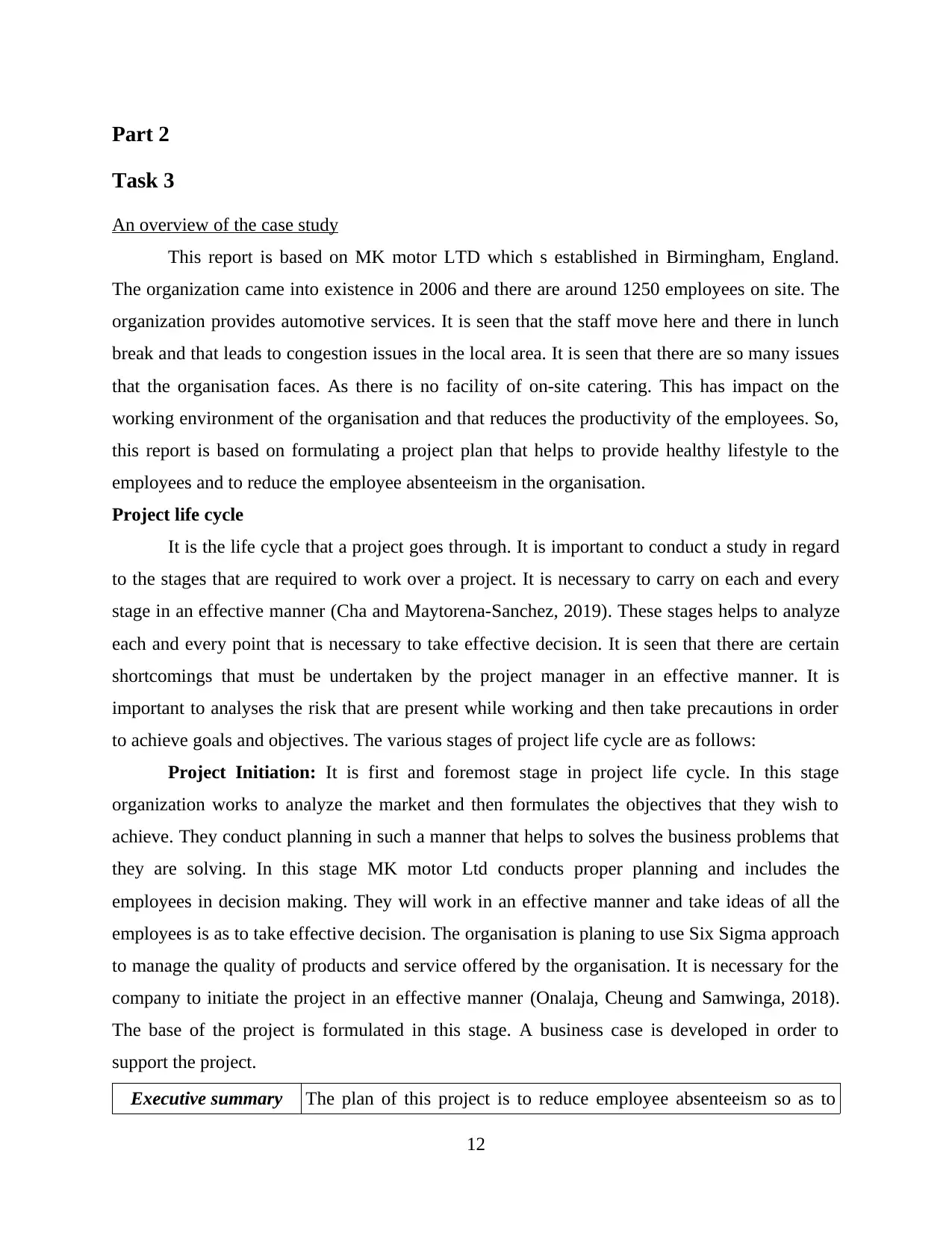
Part 2
Task 3
An overview of the case study
This report is based on MK motor LTD which s established in Birmingham, England.
The organization came into existence in 2006 and there are around 1250 employees on site. The
organization provides automotive services. It is seen that the staff move here and there in lunch
break and that leads to congestion issues in the local area. It is seen that there are so many issues
that the organisation faces. As there is no facility of on-site catering. This has impact on the
working environment of the organisation and that reduces the productivity of the employees. So,
this report is based on formulating a project plan that helps to provide healthy lifestyle to the
employees and to reduce the employee absenteeism in the organisation.
Project life cycle
It is the life cycle that a project goes through. It is important to conduct a study in regard
to the stages that are required to work over a project. It is necessary to carry on each and every
stage in an effective manner (Cha and Maytorena-Sanchez, 2019). These stages helps to analyze
each and every point that is necessary to take effective decision. It is seen that there are certain
shortcomings that must be undertaken by the project manager in an effective manner. It is
important to analyses the risk that are present while working and then take precautions in order
to achieve goals and objectives. The various stages of project life cycle are as follows:
Project Initiation: It is first and foremost stage in project life cycle. In this stage
organization works to analyze the market and then formulates the objectives that they wish to
achieve. They conduct planning in such a manner that helps to solves the business problems that
they are solving. In this stage MK motor Ltd conducts proper planning and includes the
employees in decision making. They will work in an effective manner and take ideas of all the
employees is as to take effective decision. The organisation is planing to use Six Sigma approach
to manage the quality of products and service offered by the organisation. It is necessary for the
company to initiate the project in an effective manner (Onalaja, Cheung and Samwinga, 2018).
The base of the project is formulated in this stage. A business case is developed in order to
support the project.
Executive summary The plan of this project is to reduce employee absenteeism so as to
12
Task 3
An overview of the case study
This report is based on MK motor LTD which s established in Birmingham, England.
The organization came into existence in 2006 and there are around 1250 employees on site. The
organization provides automotive services. It is seen that the staff move here and there in lunch
break and that leads to congestion issues in the local area. It is seen that there are so many issues
that the organisation faces. As there is no facility of on-site catering. This has impact on the
working environment of the organisation and that reduces the productivity of the employees. So,
this report is based on formulating a project plan that helps to provide healthy lifestyle to the
employees and to reduce the employee absenteeism in the organisation.
Project life cycle
It is the life cycle that a project goes through. It is important to conduct a study in regard
to the stages that are required to work over a project. It is necessary to carry on each and every
stage in an effective manner (Cha and Maytorena-Sanchez, 2019). These stages helps to analyze
each and every point that is necessary to take effective decision. It is seen that there are certain
shortcomings that must be undertaken by the project manager in an effective manner. It is
important to analyses the risk that are present while working and then take precautions in order
to achieve goals and objectives. The various stages of project life cycle are as follows:
Project Initiation: It is first and foremost stage in project life cycle. In this stage
organization works to analyze the market and then formulates the objectives that they wish to
achieve. They conduct planning in such a manner that helps to solves the business problems that
they are solving. In this stage MK motor Ltd conducts proper planning and includes the
employees in decision making. They will work in an effective manner and take ideas of all the
employees is as to take effective decision. The organisation is planing to use Six Sigma approach
to manage the quality of products and service offered by the organisation. It is necessary for the
company to initiate the project in an effective manner (Onalaja, Cheung and Samwinga, 2018).
The base of the project is formulated in this stage. A business case is developed in order to
support the project.
Executive summary The plan of this project is to reduce employee absenteeism so as to
12
⊘ This is a preview!⊘
Do you want full access?
Subscribe today to unlock all pages.

Trusted by 1+ million students worldwide
1 out of 20
Related Documents
Your All-in-One AI-Powered Toolkit for Academic Success.
+13062052269
info@desklib.com
Available 24*7 on WhatsApp / Email
![[object Object]](/_next/static/media/star-bottom.7253800d.svg)
Unlock your academic potential
Copyright © 2020–2026 A2Z Services. All Rights Reserved. Developed and managed by ZUCOL.




